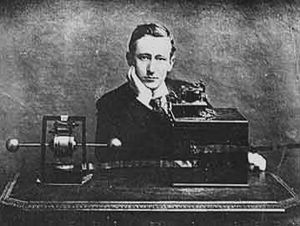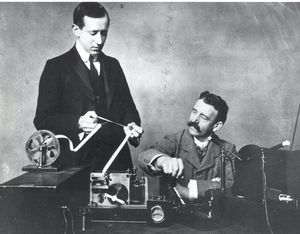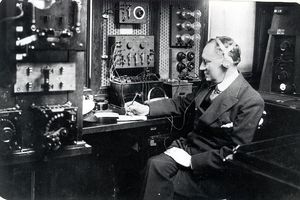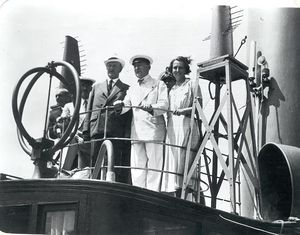Guglielmo Marconi: Difference between revisions
No edit summary |
No edit summary |
||
| Line 26: | Line 26: | ||
Marconi died in 1937 The day after his death wireless operators all over the world shut down their transmitters for two minutes of global silence. | Marconi died in 1937 The day after his death wireless operators all over the world shut down their transmitters for two minutes of global silence. | ||
== Additional Information and Professional Honors == | |||
'''Honorary Member 1917''' | |||
'''John Fritz Medalist 1923''' | |||
Famous for establishing wireless telegraphy on a commercial basis, Marconi was elected an Honorary Member of the Institute on August 14, 1917. He was born in Italy on April 25, 1874, and was educated privately. In 1895 the idea became firmly rooted in his mind that a system of telegraphy through space, could be provided by means of electromagnetic waves, the existence of which had already been determined. Marconi was the first to devise practical means by which these waves could provide a new method of communication. In 1896 he went to England, taking out during that year the first patent ever granted on wireless telegraphy. An extensive series of experiments followed, and his first commercial company was organized in 1897. During the next few years, he took out many patents on new devices in wireless telegraphy, and had much to do with the remarkable growth of this industry in many countries of the world. He also was one of the pioneers in the use of short-wave for radio communication. During the World War, Marconi served in both the Italian Army and Navy; and also visited America as a member of the Italian War Commission to the U.S. Government. He was appointed a delegate to the Peace Conference in Paris in 1919. Among the many honors he has received are the Nobel Prize for physics in 1909, the Albert Medal of the Royal Society of Arts, of Great Britain, and the 1932 Kelvin Medal of the Institution of Civil Engineers, of Great Britain. He has been decorated with the Italian order of St. Maurice and St. Lazarus, and with the Grand Cross of the Crown of Italy. In 1915 he was nominated senator of the Kingdom of Italy. In the United States, he has received the Franklin and John Fritz medals and Medal of Honor of the Institute of Radio Engineers. He is president of the Marconi Wireless Telegraph Company, Ltd., at London, England. | |||
== Further Reading == | == Further Reading == | ||
Revision as of 19:41, 28 March 2013
Biography
Born: 25 April 1874
Died: 20 July 1937
Marconi was born in Italy in 1874 to Giuseppi and Annie Jameson Marconi. His father was a wealthy Italian landowner and his mother was from a wealthy Irish family. He was educated in both Italy and England and was fluent in many languages. Marconi was educated by private tutors at home and then spent several years at the Livorno Technical Institute after failing the entrance examinations for several Italian universities. After reading an article about electromagnetic, or radio, waves, he began thinking about building a device to transmit radio waves over long distances. He understood that this method of communication would be faster than telegraphy and less cumbersome because no wires would be involved.
Starting in 1894, his parents let him use the upper floor of their Bologna estate as a laboratory. Once Marconi duplicated Heinrich Hertz’s experiments and succeeded in sending signals over long distances, he offered his idea to the Italian government. They turned him down and he took his ideas and equipment to the English government who also refused to finance him. Marconi eventually raised money privately and established the Wireless Telegraph and Signal Company in London.
By 1899 Marconi was constructing wireless stations on both sides of the English Channel and in 1901 he installed transmitters powerful enough to send messages across the Atlantic. The following year he established a company in New York. He lived a transatlantic existence, working in both Europe and the United States.
Marconi was widely recognized for his work in his own time. In 1909 he was awarded the Nobel Prize in Physics. Grateful Titanic survivors presented him with a gold medal in recognition of his work in radio, which helped save their lives in the 1912 disaster.
Unlike many other radio pioneers, Marconi was a savvy businessman. He went to great lengths to control his own patents as well as those of others in the field. Only a variety of international agreements and patent pooling schemes prevented him from establishing a monopoly on the technology. These efforts notwithstanding, by 1912 the British-based Marconi Company essentially controlled the global wireless communications industry. This virtual monopoly led to corruption charges in the effort to build communications networks across Europe. The “Marconi Scandal,” although not ruinous, eventually ended Marconi and Britain’s chances of regaining global dominance of radio, leaving the door open for the fast-rising American telecommunications industry.
As befitting his international lifestyle, in 1919 Marconi took up residence on the yacht Elettra, which served as his main home and research laboratory. The Elettra, a state-of-the-art floating laboratory, became a common sight off the coast of Cornwall, England where Marconi continued experimenting with radio waves. He also hosted many parties aboard the yacht, with guests ranging from laboratory assistants to royalty.
In addition to his scientific and business interests, Marconi was eager to demonstrate his loyalty to his native country, despite the fact that he left Italy as a young man. He undertook many diplomatic missions as a representative of Italy.
Marconi died in 1937 The day after his death wireless operators all over the world shut down their transmitters for two minutes of global silence.
Additional Information and Professional Honors
Honorary Member 1917
John Fritz Medalist 1923
Famous for establishing wireless telegraphy on a commercial basis, Marconi was elected an Honorary Member of the Institute on August 14, 1917. He was born in Italy on April 25, 1874, and was educated privately. In 1895 the idea became firmly rooted in his mind that a system of telegraphy through space, could be provided by means of electromagnetic waves, the existence of which had already been determined. Marconi was the first to devise practical means by which these waves could provide a new method of communication. In 1896 he went to England, taking out during that year the first patent ever granted on wireless telegraphy. An extensive series of experiments followed, and his first commercial company was organized in 1897. During the next few years, he took out many patents on new devices in wireless telegraphy, and had much to do with the remarkable growth of this industry in many countries of the world. He also was one of the pioneers in the use of short-wave for radio communication. During the World War, Marconi served in both the Italian Army and Navy; and also visited America as a member of the Italian War Commission to the U.S. Government. He was appointed a delegate to the Peace Conference in Paris in 1919. Among the many honors he has received are the Nobel Prize for physics in 1909, the Albert Medal of the Royal Society of Arts, of Great Britain, and the 1932 Kelvin Medal of the Institution of Civil Engineers, of Great Britain. He has been decorated with the Italian order of St. Maurice and St. Lazarus, and with the Grand Cross of the Crown of Italy. In 1915 he was nominated senator of the Kingdom of Italy. In the United States, he has received the Franklin and John Fritz medals and Medal of Honor of the Institute of Radio Engineers. He is president of the Marconi Wireless Telegraph Company, Ltd., at London, England.
Further Reading
Papers of Guglielmo Marconi - correspondence and articles, 1929 - 1937



